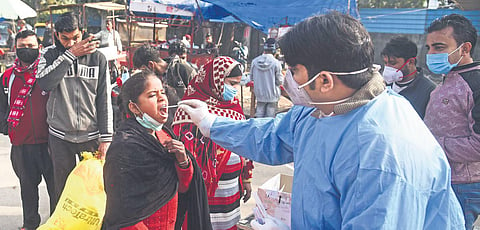

THIRUVANANTHAPURAM: The impact of the Covid surge is getting reflected faster in hospital bed occupancy although the predicted peak of the third wave is at least two weeks away. Hospital beds in private hospitals have been swamped by panicked patients even when the symptoms start appearing. Some of the major hospitals have started requesting patients to wait at home for two to three days as they want to arrange beds against discharges.
According to doctors, patients seek admission when they develop symptoms such as severe fever or diarrhoea or as a precaution as they have comorbidities. The demand for ICU and oxygen beds has increased 48% and 64%, respectively, over the past one week. The demand for ventilator beds remains more or less the same. The trend shows that the majority of newly infected are cases with mild symptoms or asymptomatic and the demand for critical care is well within the capacity of the healthcare facility. The total cases increased by 200% in the last seven days when compared to the week before.
The situation is a wake-up call to reconsider the narrative of Omicron cases that it causes only milder infection as it can still cause damage from a public health perspective, say health experts. Continuing the upward trend, the state reported 46,387 positive cases on Thursday. The test positivity rate crossed 40%. During January 13-19 period, the average total active cases per day were over one lakh. Of them, an average of only around 0.7% needed oxygen beds and 0.6% ICU admission.
As on Thursday, there were 1.68 lakh active patients in the state, but only 3% of them had been admitted to hospitals. As many as 32 deaths were also reported on the day. The bed occupancy is increasing in proportion to the increase in the active cases. Experts have been watching the disease severity by way of hospital admissions as the key metric to understand the impact of the third wave.
“The third wave has just begun. Its impact in the form of demand for more ICU beds and ventilators will reflect from next week. We will get stuck if we report one lakh cases per day. Always remember that a small percentage of a big number is a big number,” said Dr Padmanabha Shenoy, immunologist and public health expert.
“The narrative that Omicron is a mild infection and harmless is no longer true. We should have a plan so that the situation will not go out of hand. Even if the Omicron wave causes half the damage compared to Delta, we have a problem on hand,” he added. He pointed out that ventilator use in Mumbai had increased four times in three weeks, though it was still within the capacity.
Dr Althaf A, an epidemiologist and associate professor at Government Medical College Hospital, Manjeri, said the number of deaths will shoot up if the situation goes beyond the control of the healthcare capacity. He said the doubling time for Omicron is two-three days when compared to three-four days required for Delta. According to health experts, two doses of Covid vaccines offer a baseline protection for the healthy while those with comorbidities are still considered vulnerable in the present wave.